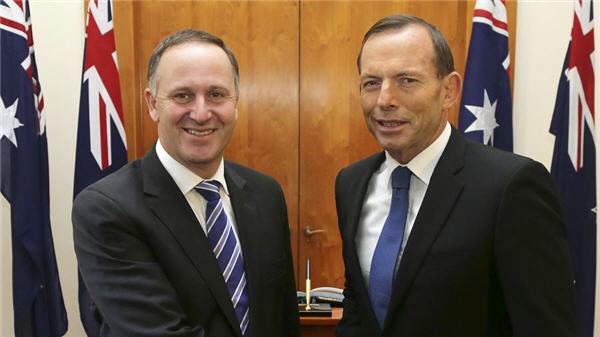Kiwis in Australia deserve better

10 October 2013
Dr Kate McMillan and Paul Hamer
Nearly 200,000 tax-paying expats are unfairly denied support, write Paul Hamer and Kate McMillan
Genuine confusion exists about the number of New Zealanders in Australia. Nor is there clarity on the number affected by 2001 changes to Australian domestic legislation that reduced New Zealanders' access to welfare and citizenship in Australia. Various numbers have been bandied around, particularly since the talks last week between the two Prime Ministers, John Key and Tony Abbott.
According to the Department of Immigration and Citizenship (DIAC), the most authoritative source on the matter, there are about 640,000 New Zealand citizens in Australia. But at any one time, says DIAC, about 80,000-100,000 are there on holiday or for short business trips, and are not really residents. That matches Statistics New Zealand's figures on short-term New Zealand resident departures to Australia. So roughly 550,000 New Zealand citizens actually live across the Tasman.
Of these, about 200,000 arrived to live after February 26, 2001, and around 15,000 of these people have been able to obtain an Australian permanent visa. By deduction, the number of “unprotected” New Zealand citizens living in Australia is thus around 185,000 (but steadily growing).
One academic commentator suggested last week that very few - numbering in the hundreds - were really affected by the 2001 restrictions, while the vast majority of New Zealanders were unaffected. This is plainly wrong. The idea that only a few hundred people have been or are affected by the lack of access to things like public housing, travel concessions and unemployment, sole parent, youth and sickness benefits does not stack up. An official unemployment rate among the New Zealand-born in Australia of 5 per cent suggests at least several thousand on unprotected visas are out of work.
Moreover, every New Zealander who has not been able to gain a permanent visa is affected by the lack of a vote, and many are affected by the lack of access to public sector employment, and exclusion from student loans. Then there is the frustration that comes from being blocked from ever contributing to society as a citizen. This truly irks people, as our research has discovered.
More confusion surrounds the issue of whether New Zealand agreed to the 2001 changes or not. New Zealand and Australia agreed - at New Zealand's suggestion - to a reciprocal social security regime covering only old-age pensions and invalids' benefits, and agreed that each country could set its own rules for the payment of any other benefits. This doesn't mean New Zealand agreed to what Australia then implemented.
What is the solution
Various solutions for the plight of New Zealanders have been proposed. One common argument has been that New Zealanders who are struggling across the ditch should just come home. While this is an option for some New Zealanders, for others it is unfeasible. Child custody arrangements, for example, can prevent women who have been in violent relationships from bringing their children back to New Zealand.
Moving back is also difficult for those whose families moved to Australia when they were children. For many such young people, their families, friends and schooling experiences are almost entirely Australian-based. They speak with Australian accents. When they leave school they find their access to university is blocked by their inability to access student loans. Lucrative trade careers are similarly blocked by apprenticeship rules that favour their Australian citizen classmates. Yet gaining skills and qualifications is their primary pathway to meeting permanent residency criteria, and thus their best chance of achieving citizenship and voting rights in Australia.
They could come “home” to study. But is it really desirable that young people be forced to leave behind the support of family and friends to access subsidised tertiary education and student loans in New Zealand, especially given their families have been paying taxes in Australia, not New Zealand?
For many other New Zealanders, their roots in Australia are now so deep that moving back to New Zealand would be financially and personally costly. Hundreds of thousands of Kiwis have invested in careers, houses, and relationships in Australia, as well as in local communities there.
Their experiences are evidence that efforts by the Australian and the New Zealand Governments to create a common Australasian labour market have been highly successful. There can also be no doubt that both economies have benefited from New Zealanders' ability to access jobs in Australia when the job market is tight here.
This has led some advocates for New Zealanders in Australia to point to the European Union as a model for how to deal with labour mobility across a common labour market. The insurance-based model of welfare in much of the EU, however, makes this model difficult to apply in the Australasian context, although undoubtedly there is much that can be learned from the EU experience.
Conclusion
The consequences of free movement are profound and complex. Our research has shown that New Zealanders highly value the opportunity to live and work in Australia, and the majority benefit from doing so. The vulnerability experienced by a growing group of New Zealanders in Australia, however, and their long-term inability to fully belong in their adopted country, suggests that the present policies are unsustainable.
Read the NZ Herald article.
Dr Kate McMillan is a senior lecturer in politics at Victoria University of Wellington. Dr McMillan is researching the citizenship experiences of New Zealand citizens resident in Australia.
Paul Hamer is an adjunct research associate in Maori studies at Victoria University of Wellington. Mr Hamer is studying the impact of the 2001 changes on Maori in Australia, and asking Maori who have returned to New Zealand from Australia why they've come back.